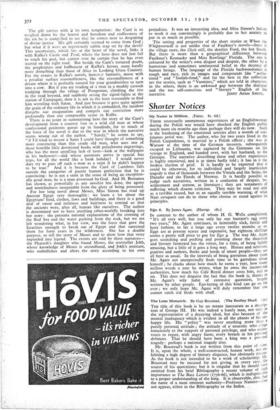Shorter Notices
My Name is Million. (Faber. 8s. 6d.) THESE necessarily anonymous experiences of an Englishwoman during the Polish war would have shocked the English public much more six months ago than perhaps they will do now. Such is the hardening of the emotional arteries after a month of con- tinuous aerial war. The author, who for two years lived in the Polish Carpathians, is married to a Polish officer ; she was in Warsaw at the time of the German invasion, subsequently escaped to Lithuania, was captured by the Germans on the voyage to England, and handed over, with her husband, to the Gestapo. The narrative describing these and other experiences is highly emotional, and is at times badly told ; it has in it the broken rhythm of grief. It is hardly to be expected that it could be otherwise, for its individual and largely inarticulate tragedy is that of thousands between the Vistula and the Seine, the Danube and the Fjords of Norway. It is hardly possible to judge such narratives, written in a confusion of despair, be- wilderment and sorrow, as literature ; they are testaments of suffering which disarm criticism. They may be read not only as a terrible record, but as an equally terrible warning, of what Nazi conquest can do to those who choose to stand against its principles.


























 Previous page
Previous page